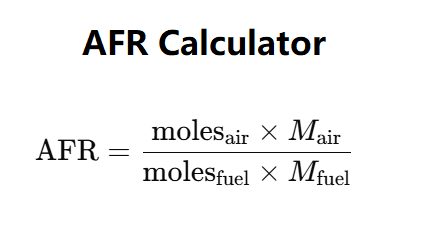 Home
Home
 Back
Back

Air-Fuel Ratio (AFR) Calculator computes the stoichiometric ratio of air to fuel required for complete combustion, as well as the mass of air needed for a given fuel mass.
It is widely used in combustion processes, including internal combustion engines, gas turbines, and heating devices, to optimize efficiency and reduce emissions.
Select a fuel type or choose 'Custom' and input a custom AFR value, then provide the mass of fuel. The calculator uses the following formulas:
Click 'Calculate' to see the results.
Example 1 (Methane): Fuel = Methane, Mass of Fuel = 1 kg.
Calculation: AFR = 17.19:1, Mass of Air = 1 × 17.19 = 17.19 kg
Example 2 (Custom): Custom AFR = 9.0, Mass of Fuel = 1 kg.
Calculation: AFR = 9.0:1, Mass of Air = 1 × 9.0 = 9.0 kg
Example 3 (Propane): Fuel = Propane, Mass of Fuel = 2 kg.
Calculation: AFR = 15.64:1, Mass of Air = 2 × 15.64 = 31.28 kg
Enter values and click 'Calculate' to verify.
1. What is the air-fuel ratio?
AFR is the mass ratio of air to fuel required for complete combustion, with stoichiometric AFR being the ideal ratio.
2. How is mass of air calculated?
It’s calculated as the mass of fuel multiplied by the AFR.
3. What is a custom AFR?
For custom fuels, you input the AFR value manually to calculate the mass of air required.
4. Why use stoichiometric AFR?
It ensures complete combustion, optimizing energy release and minimizing pollutants.